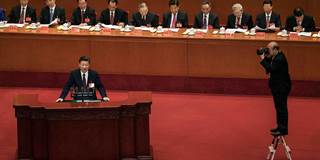In another country, Chinese President Xi Jinping's concentration of power might trigger accusations of latter-day totalitarianism. In China, however, Xi's behavior has drawn praise from observers who believe that he is leading the way to the fulfillment of the “Chinese dream” of national rejuvenation.
HONG KONG – An anecdote about US President Richard Nixon’s visit to China in 1972 has long been regarded as confirmation of the long view of history taken by Chinese leaders. Zhou Enlai, Mao’s dutiful number two, is said to have responded to a question about the lessons of the French Revolution by saying that it was too soon to tell. In fact, according to diplomats who were there, Zhou was discussing not the revolution of 1789, but the 1968 student uprising in Paris, so it probably really was too soon to tell.
After this false start, lessons from the French Revolution have made a comeback in China. Shortly after the 18th National Congress of the Chinese Communist Party in 2012, it was reported that Alexis de Tocqueville’s The Old Regime and the Revolution, written in 1856, had become a “must-read” for senior CCP cadres. The book’s merits were most enthusiastically touted by Wang Qishan, the man at the helm of President Xi Jinping’s anti-corruption campaign and perhaps Xi’s closest ally.
Toqueville argued that growing prosperity in eighteenth-century France had actually made it more difficult to govern the country. As people became wealthier, they also became more aware of social and economic inequalities and thus increasingly resentful of the rich and powerful. Attempts to reform the system only highlighted its vulnerabilities. Revolution followed, sweeping away the monarchy and aristocracy. Their heads literally rolled.

HONG KONG – An anecdote about US President Richard Nixon’s visit to China in 1972 has long been regarded as confirmation of the long view of history taken by Chinese leaders. Zhou Enlai, Mao’s dutiful number two, is said to have responded to a question about the lessons of the French Revolution by saying that it was too soon to tell. In fact, according to diplomats who were there, Zhou was discussing not the revolution of 1789, but the 1968 student uprising in Paris, so it probably really was too soon to tell.
After this false start, lessons from the French Revolution have made a comeback in China. Shortly after the 18th National Congress of the Chinese Communist Party in 2012, it was reported that Alexis de Tocqueville’s The Old Regime and the Revolution, written in 1856, had become a “must-read” for senior CCP cadres. The book’s merits were most enthusiastically touted by Wang Qishan, the man at the helm of President Xi Jinping’s anti-corruption campaign and perhaps Xi’s closest ally.
Toqueville argued that growing prosperity in eighteenth-century France had actually made it more difficult to govern the country. As people became wealthier, they also became more aware of social and economic inequalities and thus increasingly resentful of the rich and powerful. Attempts to reform the system only highlighted its vulnerabilities. Revolution followed, sweeping away the monarchy and aristocracy. Their heads literally rolled.